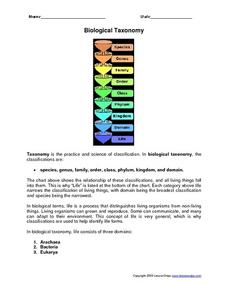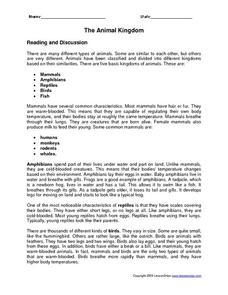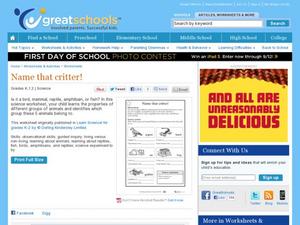University of Hawaiʻi
Taxonomy and Me!
Taxonomy is the study of organisms and how you phylum. Three biology activities are included, helping scholars understand four of the six kingdoms, specifically Protista, Plantae, Fungi, and Animalia. Scholars observe and classify...
South Gloucestershire Council
Animal Classification: A Collaborative Sorting Activity for Key Stages 2 & 3
Introduce the logic behind a dichotomous key or administer a group performance assessment with a fun and challenging classification lesson. With explicit instructions for the teacher and for collaborative groups, as well as engaging...
Curated OER
Biological Taxonomy
In this biology learning exercise, students read about biological taxonomy. They then use the information they learned to answer the 13 questions on the learning exercise. The answers are on the last page of the packet.
Curated OER
Classification/Taxonomy/Statistics Review
"Does King Phillip Cry Over Flimsy Grass Stems?" You might not answer that question with this exhaustive worksheet, but your biology class will get the full scoop on the hierarchy of biological classification with this resource. It...
Curated OER
Animals Belong in Class
In this classifying animals worksheet, students use the information in the word bank to complete the T-Chart about mammals, birds, fish, reptiles, amphibians, and arthropods. Students write 10 answers.
Curated OER
Taxonomy
In this biology worksheet, students complete a crossword puzzle with 39 questions on taxonomy. They identify the different classification systems used in biology.
Curated OER
Organizing Life
In this taxonomy worksheet, learners learn about Linnaeus' system for classifying living things. Students complete 2 fill in the blank and 2 short answer questions based on what they read.
Curated OER
Classification of Life
For this classification of life worksheet, learners use an on line source to answer questions about how species are classified, named and grouped. They give the classification of a bear, an orchid and a sea cucumber.
Curated OER
The Animal Kingdom
In this animal kingdom worksheet, students read for information and determine comprehension. In this matching and fill in the blanks worksheet, students answer twelve questions.
Curated OER
All About Arthropods
Use a dichotomous key to classify these squirmy bugs. A paragraph provides fifth graders with some background knowledge on the animal kingdom, and explains how to use a branching key for classification. They then determine which bugs...
Curated OER
Fly Detective
Learners use classification skills and clues to determine which flying insect is the one they need to circle. They read four clues and examine each of the five insects depicted. They then deduce which one is the mystery insect. Answers...
Curated OER
Distinguishing Between Flowers
A branching key is a great way to classify different types of animals and plants! Fifth graders answer several yes/no answers about three different plants. They then create their own key to differentiate between an iris, a rose, and a...
Curated OER
Name That Critter
Young learners classify five different animals into their proper category. The animals pictured are a pigeon, a lizard, a cat, a frog, and a goldfish. Pupils are also asked to tell why they know it's a certain kind of animal. An...
Curated OER
What is Classification?
In this classification worksheet, students describe the difference between Homo erectus and Homo sapiens. Then they define taxonomy and explain what was wrong with Aristotle's method of classification. Students also describe their...
Curated OER
Echinoderms
Echinoderm structure and characteristics are the focus of this reading comprehension and labeling worksheet. Attractive diagrams and ample information make this a suitable homework assignment for your biology buffs when learning...
Manchester University
Where The Forest Meets The Sea
Join a father and his son as they explore an isolated location off the coast of Australia in the children's book Where the Forest Meets the Sea by Jeannie Baker. Engage young learners in reading this fun story with this series of...
Curated OER
Animal Classification
For this animal classification worksheet, students read for information and comprehension. In this fill in the blank and multiple choice worksheet, students answer five questions.
Curated OER
Classification of Words and Ideas
In this classification worksheet, students pick the words that do not belong, make up the title for groups of words, and choose the title for the group of words. Students complete 3 activities.
Curated OER
Name that animal
A great way to classify organisms, is by counting the number of legs it has or how it moves. Little ones count the legs on five different creatures, then match the leg count to the proper animal name. Tip: Have them come up with other...
Curated OER
Classification and Adaptations- Streams, Rivers, and Lakes - Where the Land Meets the Sea And Caribbean Reef
For this science worksheet set, students answer 14 short answer questions about the classification and adaptation of life in streams, rivers, and lakes. They also answer 15 questions about life "Where the Land Meets the Sea" and in a...
Curated OER
Science - How are Animals Grouped?
In these categorizing animals worksheets, students complete 20 true or false statements about animal groups. Students then classify the animals in the box into the correct column. Students write the letter of the correct answer for the...
Curated OER
Using a Flow Chart for Classification
In this flow chart learning exercise, students learn to use flow charts for classification of numbers, geometric shapes and animals. Students follow the directions and fill out flow charts to work out 20 answers. This is an online...
Curated OER
Animal Families
In this animal families activity, students match the name of a baby animals to the adult name. Next, they match the name of the animal to the name of its animal group, such as herd, pack, gaggle, etc. There are 15 baby animal names,...
Curated OER
Classifying
For this classifying worksheet, learners are given 8 rows of illustrations of animals. Students try out various ways to organize the animals in a classification system following the directions. They try a 2 groups system and a 3-5 group...

























